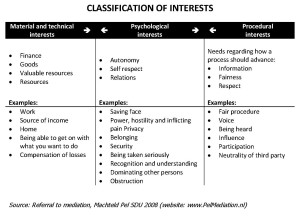As we all know mediation is an interest-based method to resolve conflicts. Nevertheless it is not always easy to know:
• which interests drive parties into a conflict
• which interests make them want to resolve conflicts and
• which interests have to be met in the solution.
The first question I ask in the first mediation session is always:
• what would it mean to you if you were able to resolve the conflict in a manner acceptable for you both ?
Without exception the answer is of the same nature and contains elements of their interests: ending the stress, preserving the relationship, clarifying the future, reclaiming time for more constructive matters and limiting the costs of terminating the conflict. These interests are served by simply terminating the conflict or problem.
These interests are to be distinguished from another category of interests, that is the interests addressed by the details of the solution. The first category of interests constitutes the incentives to work on terminating the conflict. For example an important factor in conflicts is uncertainty. Uncertainty is one of the most potent causes of stress. Ending or avoiding uncertainty can be an important incentive in opting for mediation. Taking back the responsibility for the resolution of conflict gives back the feeling of autonomy and self esteem. This shows us that interests in mediation are not always of a material nature.
Interests are the concerns and needs of people in certain situations, which drive them in a direction in which they believe these concerns and needs can be satisfied. Interests are the key criteria that solutions have to satisfy. Several years ago I was one of the authors of a book published in the Netherlands called ‘The Importance of Interests’ (‘Het belang van belangen’, by Machteld Pel en Judith Emaus, mediationreeks). We researched the nature of the interests that played a role in (resolving) conflicts, leading us to a classification of interests in three categories: material, psychological and procedural interests, as showed in the chart below (click on the image to enlarge).
In my practice in commercial mediations it is obvious that material interests (e.g. the need to make a profit or the need to maintain employment in the company) are in many commercial conflicts an important incentive to wanting resolve the conflict. Nevertheless it turns out in theory and practice that psychological interests are the real incentives for starting and ending conflicts. Attention to injured psychological interests often brings the turning point for a solution in mediation.
This means that it can make little sense to home in on the material or technical interests of the parties in the conflict because the interests of different kinds are in most cases interlinked. Respecting or violating psychological and procedural interests has a direct and indirect impact on the scope and quantity of the substantive interests. Therefore knowledge of the interaction of these interests leads often to real understanding between parties and a sustainable solution between them.
________________________
To make sure you do not miss out on regular updates from the Kluwer Mediation Blog, please subscribe here.



